The presence of "divine" in any single act and moment of human existence represents an important aspect of traditional roman religion. Each single detail of life around us is thus depicted by "small Gods/Goddesses". Making details sacred basically means to give a special respect for them.
Children's birth and life are typical examples of this divine presence:
Children's birth and life are typical examples of this divine presence:
- Vitumnus/a - giving life
- Sentinus/a - giving feelings
- Opis - she takes the child from the soil at birth
- Vaticanus/a - first child's whimpers
- Levana - she takes the child from the ground
- Cumina - she defends the baby in the cradle
- Potina - she quenches child's thirst
- Educa - she nourishes children
- Paventinus/a - he/she defends childred from fear
- Abeona - she defends the child when going to school
- Adeona - she defends the child when coming back from school
In the same way, agriculture is characterized by the presence of many Gods/Goddesses.
- Vervactor - the fallow
- Reparator - mending fields
- Imporcitor - great ploughing
- Insitor - the sowing
- Oberator - superficial ploughing
- Occator - the harrow
- Sorritor - the rake
- Messor - the harvest
- Convector - transporting harvest
- Conditor - harvest storage
